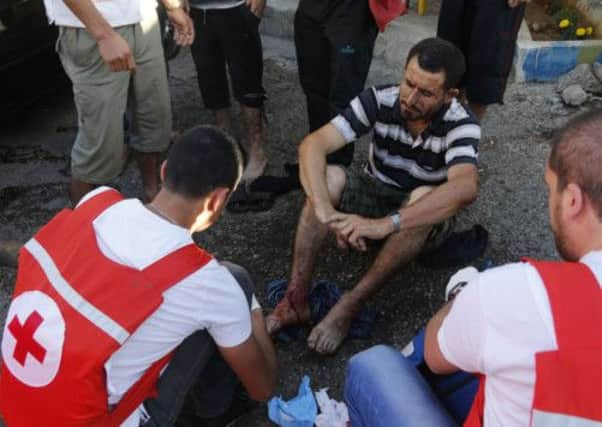Syria: Beirut hit as fears spread over Syrian war


It was the first attack to apparently target Shiite militant group Hezbollah’s stronghold in the south of the Lebanese capital since the outbreak of the two-year conflict in neighbouring Syria, which has sharply heightened Lebanon’s sectarian tensions.
The United States and Russia have proposed an international peace conference to tackle a civil war that has killed more than 80,000 people, made 1.5 million Syrians refugees and raised the spectre of sectarian bloodshed in the wider region.
Advertisement
Hide AdAdvertisement
Hide AdSyria’s government will “in principle” attend the talks tentatively set for June in Geneva and believes it will be an opportunity to resolve the crisis, Syrian foreign minister Walid al-Moualem said during a visit to Baghdad yesterday.
In an apparent rebuff of Western calls for Syrian president Bashar al-Assad to cede power as part of any deal on a political transition, Mr Moualem said: “No power on earth can decide on the future of Syria. Only the Syrian people have the right to do so.”
Whether the exiled Syrian civilian opposition will take part in the envisaged peace talks – and be able to negotiate effectively, given its internal divisions and shaky rapport with rebels inside Syria – remains in doubt.
The Islamist-dominated coalition has been hamstrung by power struggles during talks going on in Istanbul aimed at broadening its representation and electing a cohesive leadership.
The talks stalled yesterday in a factional dispute over proposals to dilute Qatar’s influence on rebel forces, with Saudi Arabia angling to play a greater role now that Iranian-backed Hezbollah was openly fighting for Mr Assad – effectively making Syria a proxy war between Tehran and Riyadh.
Syria’s conflagration has polarised tiny Lebanon, with Sunni Muslims supporting the mainly Sunni insurgency against Mr Assad, and Shiite Hezbollah standing by the president, whose minority Alawite sect derives from Shiite Islam.
In yesterday’s attack in Beirut, one rocket landed in a car sales forecourt next to a busy road junction in south Beirut’s Chiah neighbourhood, and the other struck an apartment several hundred metres away, wounding five people, residents said.
There was no immediate claim of responsibility. Brigadier Selim Idris, head of Syria’s Western-backed rebel military command, told Al-Arabiya Television that his forces had not carried out the attack.
He urged rebels to keep their conflict inside Syria.
Advertisement
Hide AdAdvertisement
Hide AdBut another Syrian rebel, Ammar al-Wawi, told Lebanon’s LBC Television the attack was a warning to authorities in Beirut to restrain Hezbollah. “In coming days we will do more than this. This is a warning to Hezbollah and the Lebanese government to keep Hezbollah’s hands off Syria,” he said.
Hezbollah leader Sayyed Hassan Nasrallah had declared on Saturday night that his heavily-armed fighters were committed to the conflict against what he called radical Sunni Islamist rebels in Syria, whatever the cost.
“We will continue to the end of the road. We accept this responsibility and will accept all sacrifices and expected consequences of this position,” he said in a televised speech. “We will be the ones who bring victory.”